Agriculture Business Plan Samples
-
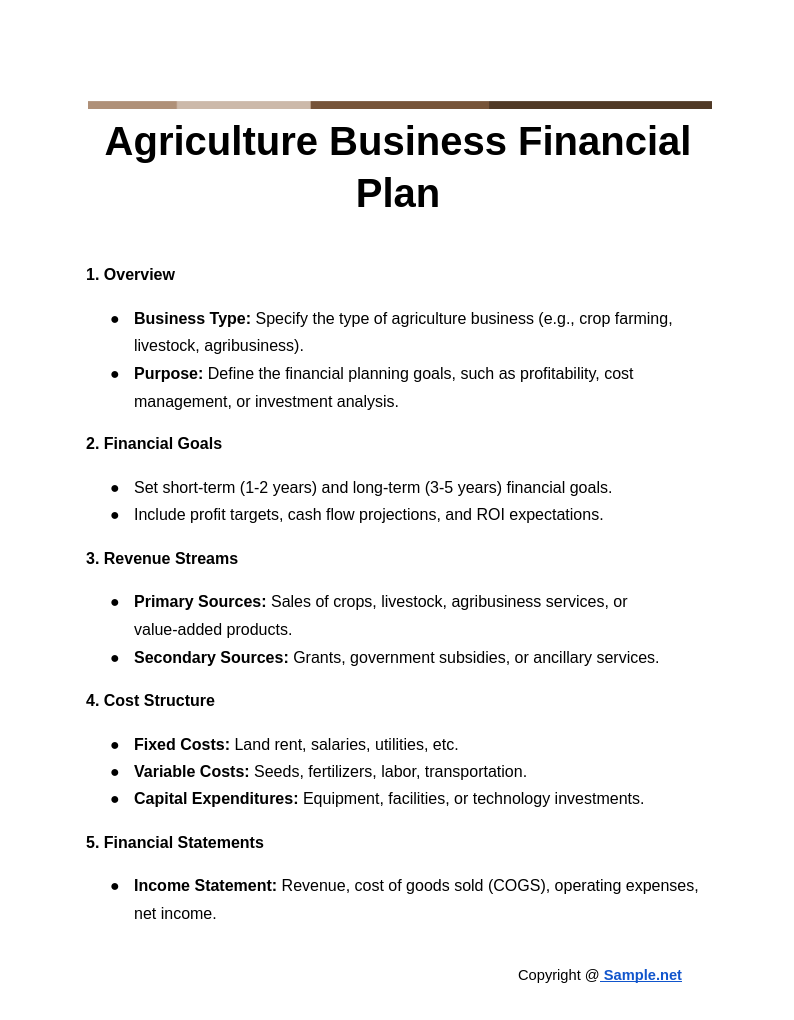
Agriculture Business Financial Plan
download now -
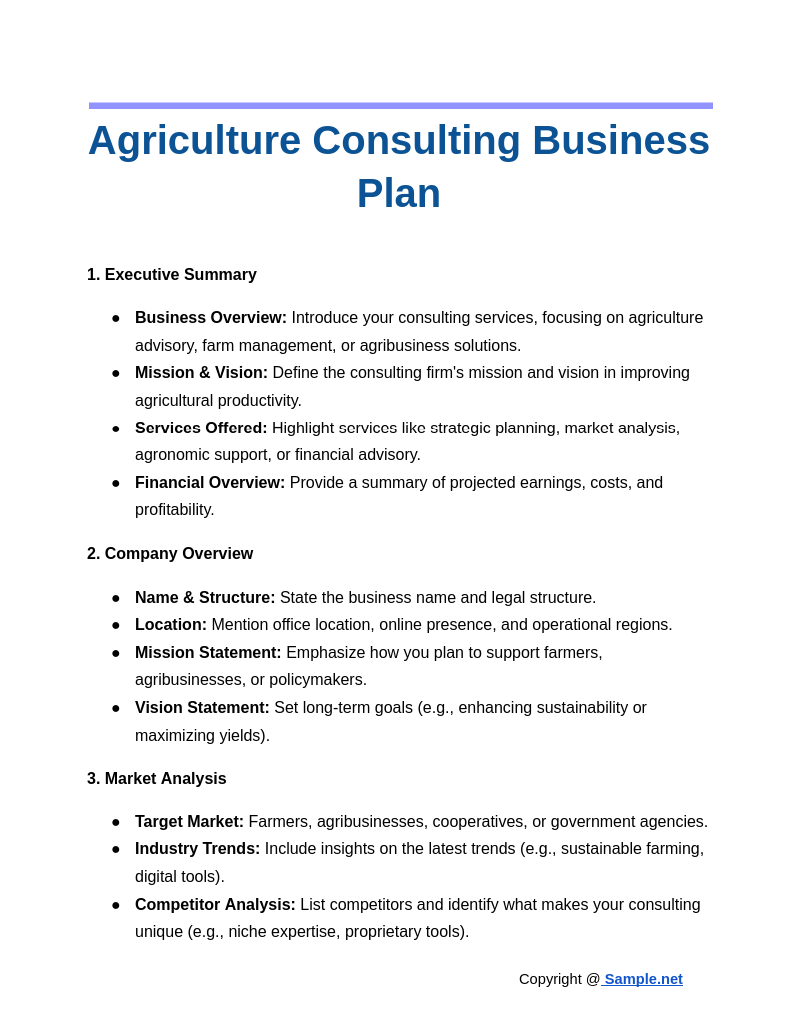
Agriculture Consulting Business Plan
download now -
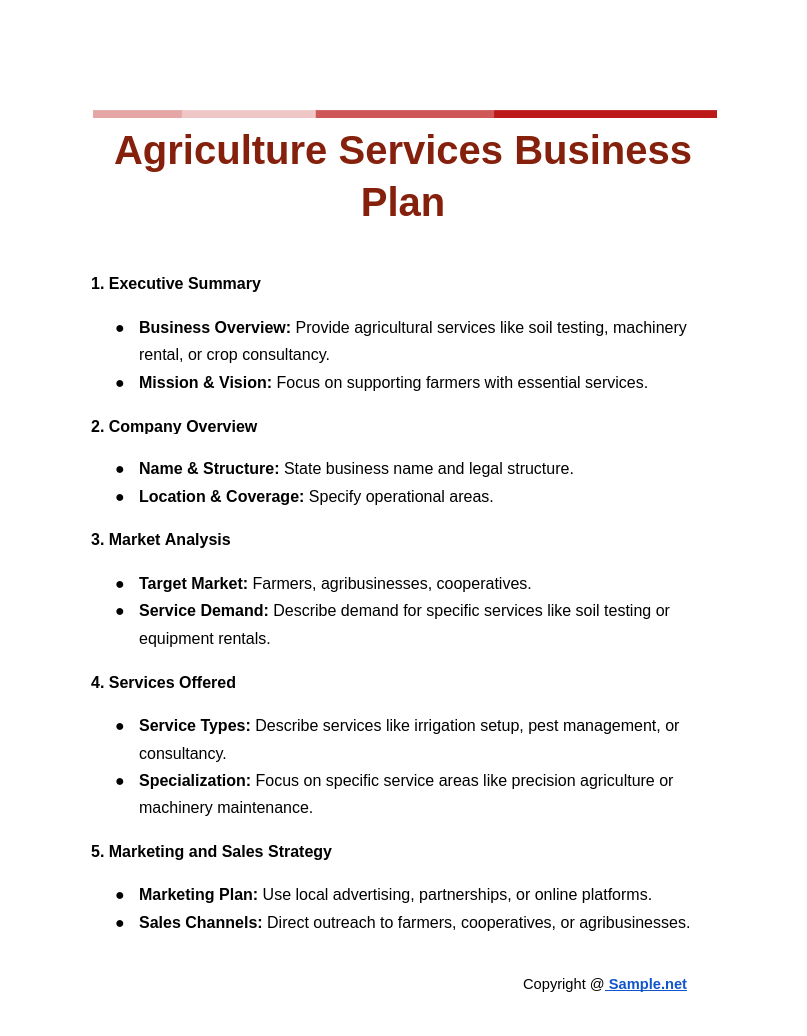
Agriculture Services Business Plan
download now -
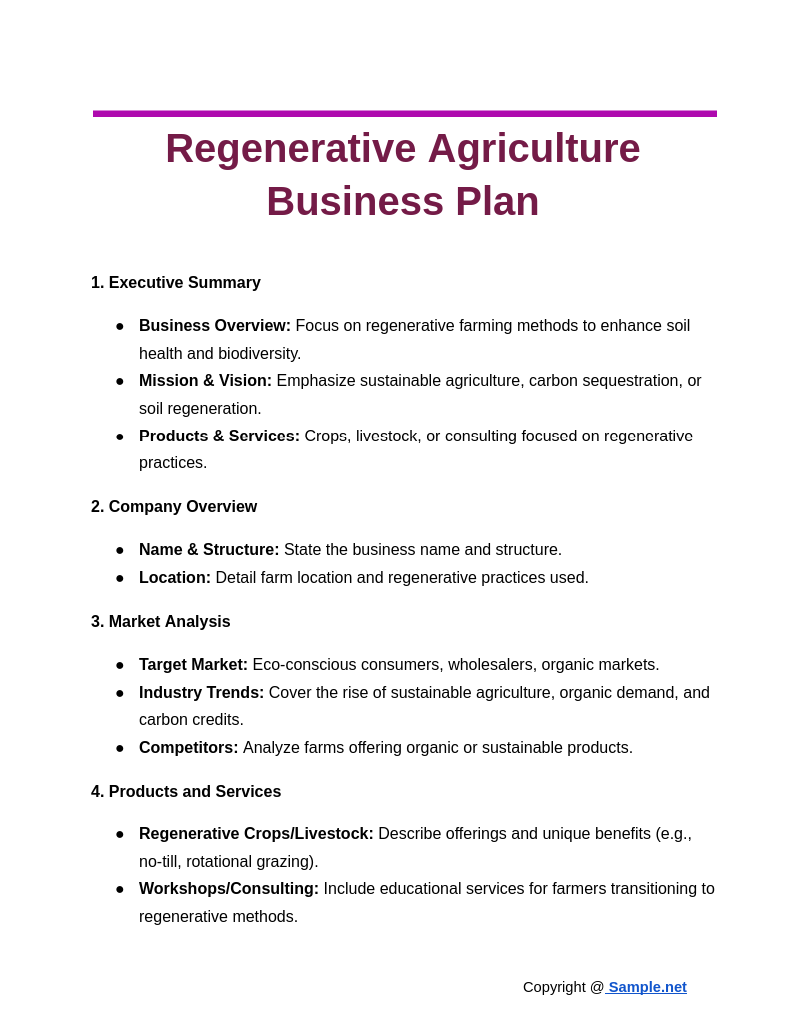
Regenerative Agriculture Business Plan
download now -
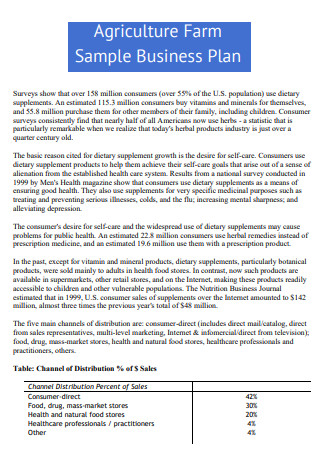
Agriculture Farm Business Plan
download now -
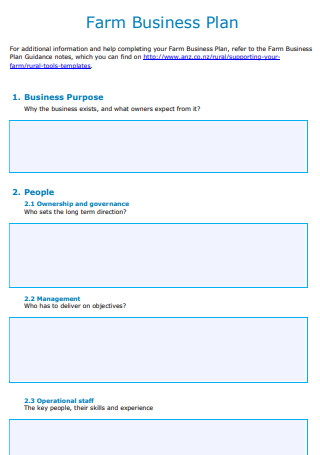
Farm Business Plan
download now -
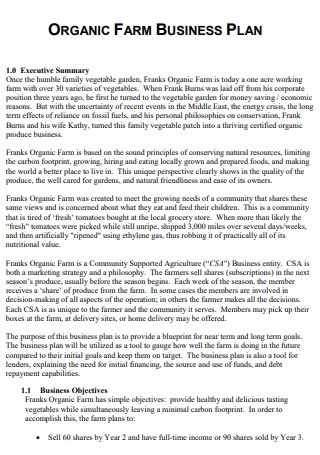
Organic Farm Business Plan
download now -
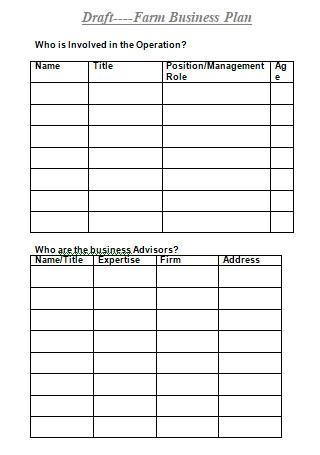
Draft Farm Business Plan
download now -
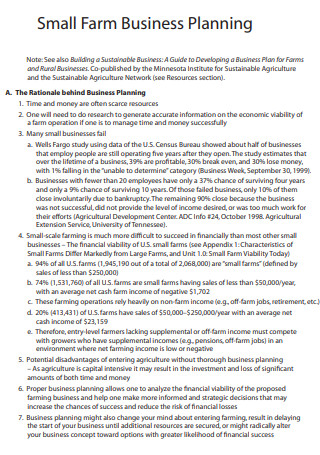
Small Farm Business Plan
download now -
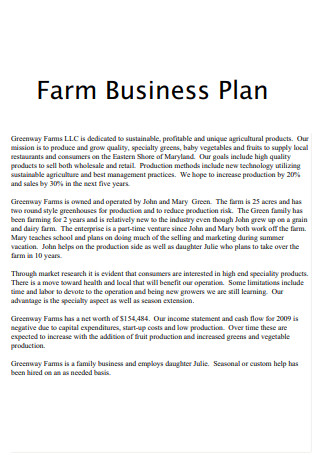
Simple Farm Business Plan
download now -
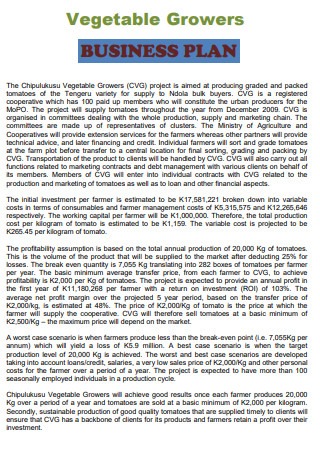
Vegetable Farm Business Plan
download now -
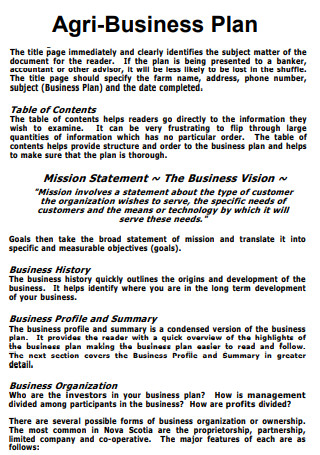
Agri-Business Plan
download now -
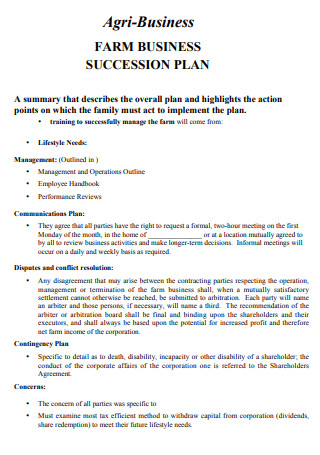
Farm Business Succession Plan
download now -
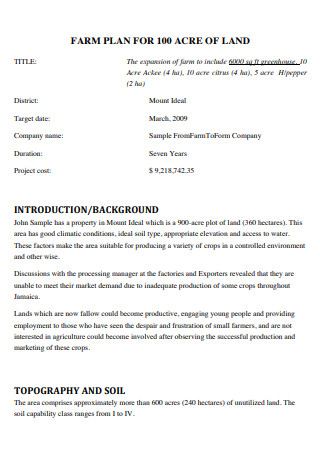
Sample Agriculture Business Plan
download now -
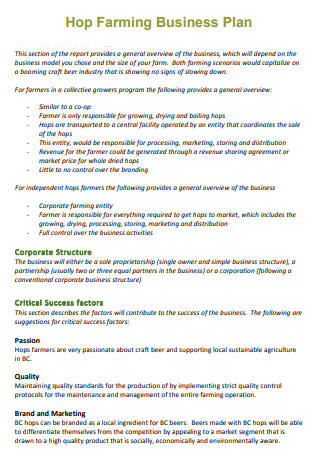
Hop Farming Business Plan
download now -
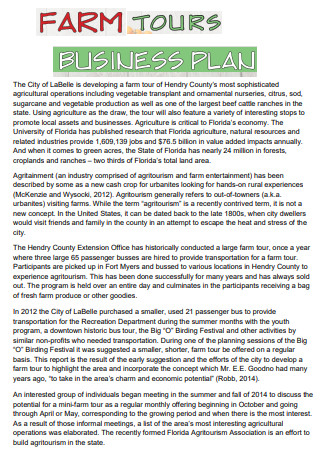
Farm Tour Business Plan
download now -
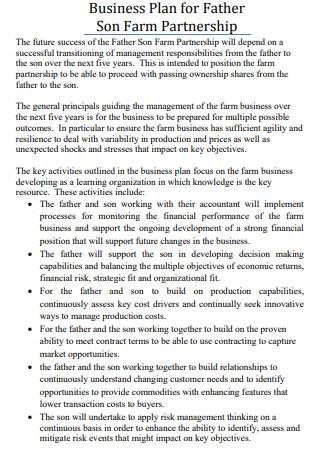
Partnership Business Plan for Farm
download now -
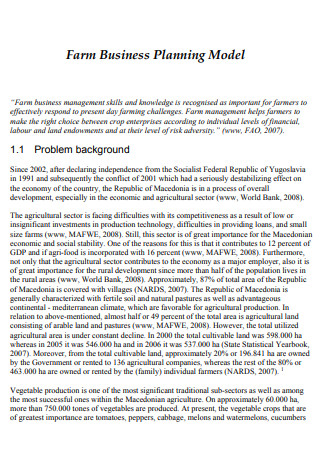
Farm Business Planning Model
download now -
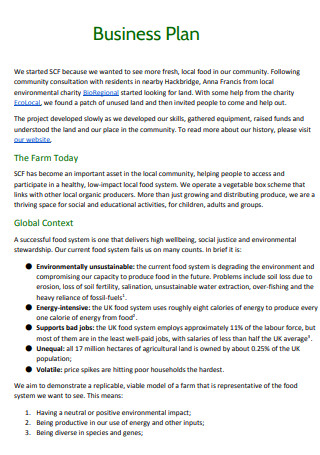
Community Farm Business Plan
download now -
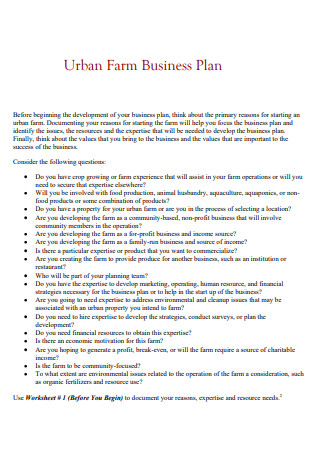
Urban Farm Business Plan
download now -
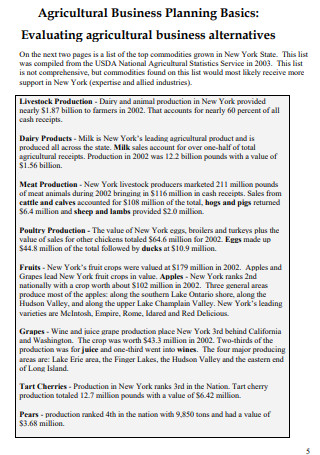
Agriculture Farms Business Plan
download now -
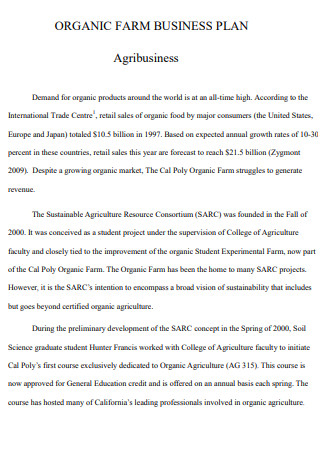
Organic Farm & Agriculture Business Plan
download now -
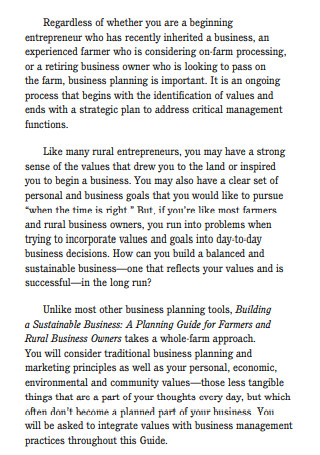
Sustainable Agriculture Farm Business Plan
download now -
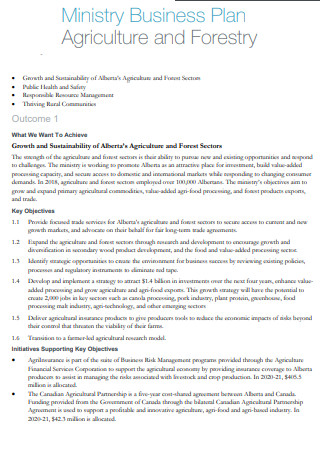
Agriculture and Forestry Business Plan
download now -
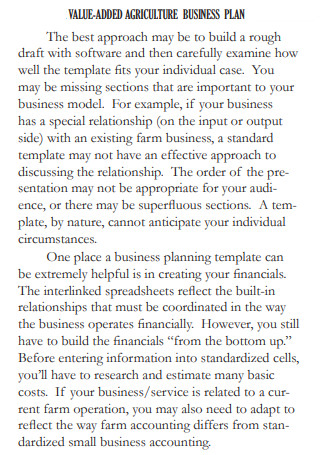
Value Added Agriculture Business Plan
download now -
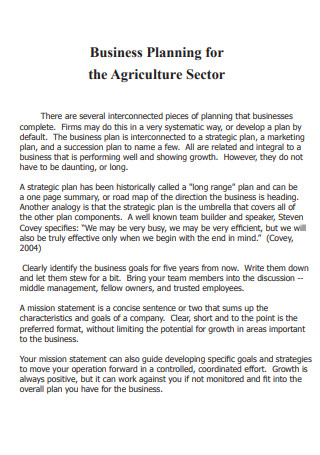
Agriculture Sector Business Plan
download now -
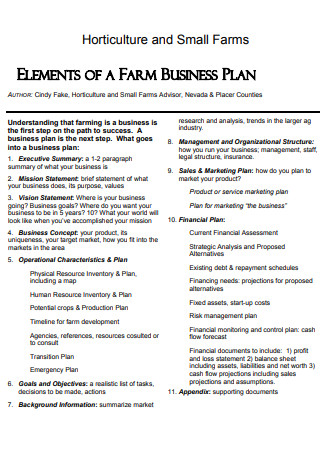
Elements of Agriculture Business Plan
download now -
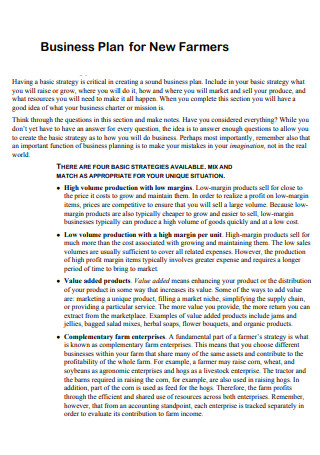
New Farmers Business Plan
download now -
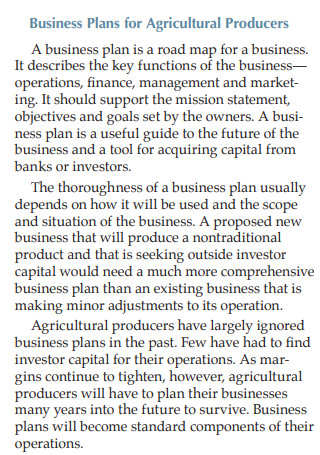
Agricultural Producers Business Plan
download now -
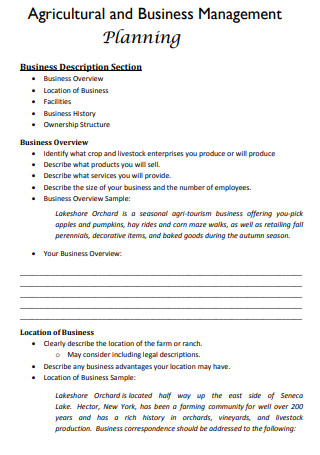
Agricultural and Business Management Business Plan
download now -
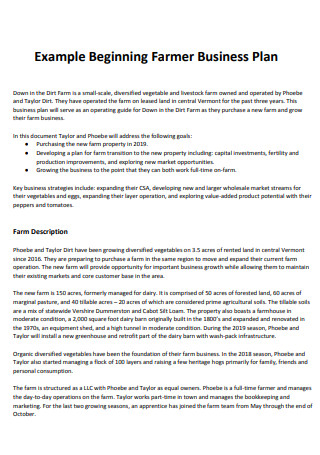
Beginning Farmer Business Plan
download now -
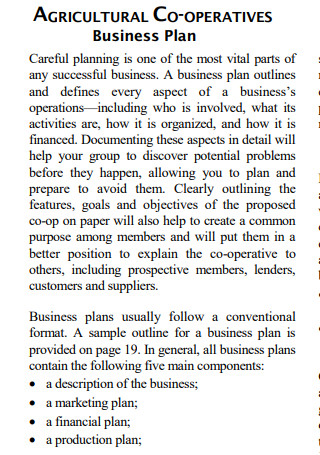
Agricultural Co-operatives Business Plan
download now -
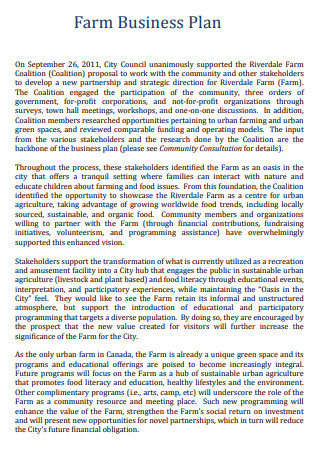
Agricultural Business Plan Example
download now -
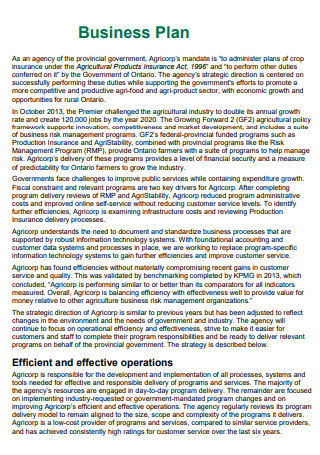
Standard Agricultural Business Plan
download now -
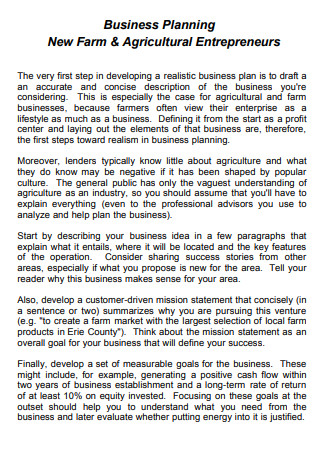
Agricultural Entrepreneurs Business Plan
download now -
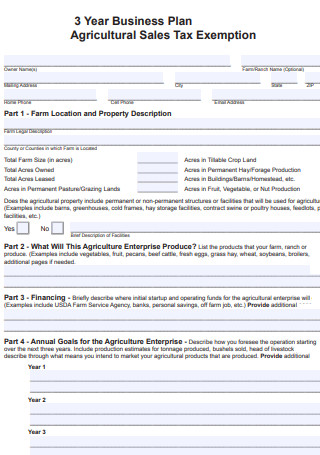
Agricultural Sales 3 Year Business Plan
download now -
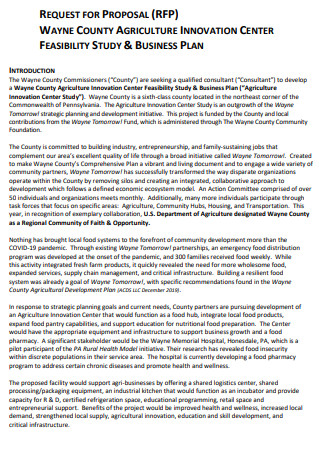
Agricultural Innovation Business Plan Request Proposal
download now -
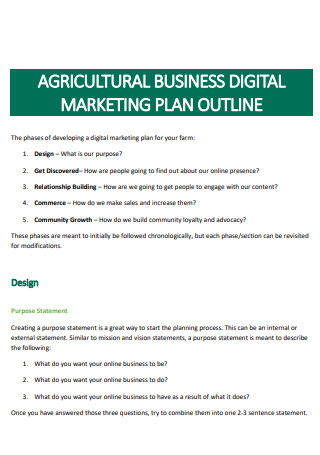
Agricultural Business Digital Marketing Plan
download now -
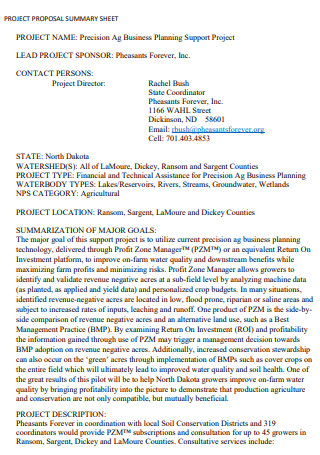
Precision Agricultural Business Plan
download now -
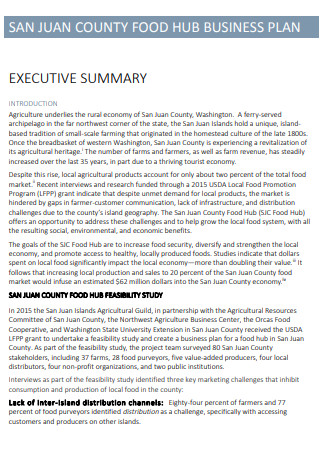
Food Hub Business Plan
download now -
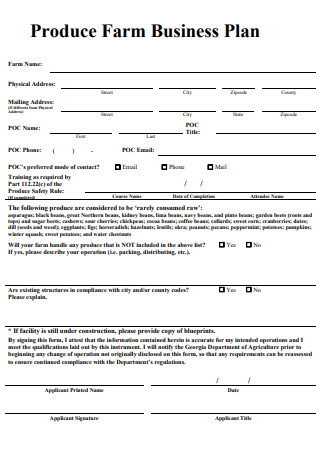
Produce Farm Business Plan
download now -
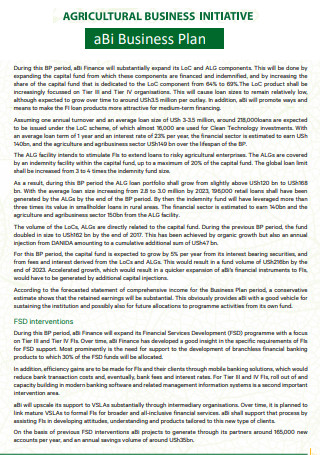
Agriculture Business Initiative Plan
download now -
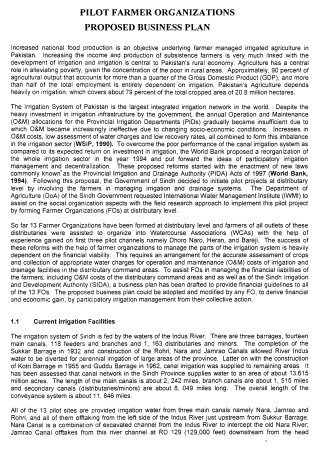
Pilot Framers Business Plan
download now -
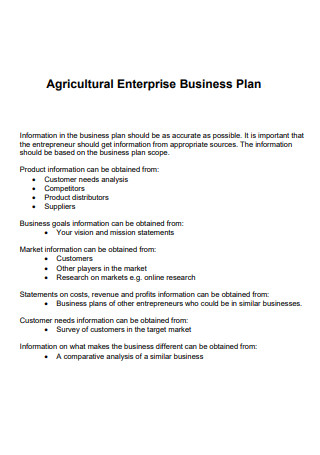
Agricultural Enterprise Business Plan
download now -
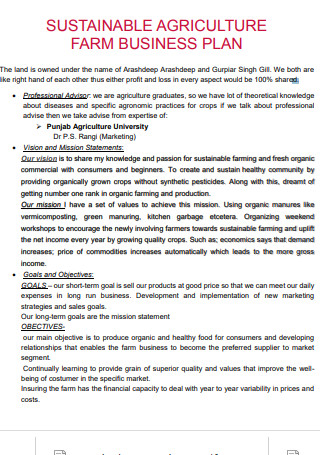
Sample Sustainable Agriculture Farm Business Plan
download now
FREE Agriculture Business Plan s to Download
Agriculture Business Plan Format
Agriculture Business Plan Samples
What Is an Agriculture Business Plan?
Benefits of Agriculture Business Plan
Tips on Agriculture Business Plan
How to Write an Agriculture Business Plan
FAQs
What is the use of an agriculture business plan?
Is there a great income in an agriculture business?
How often should an Agriculture Business Plan be updated?
How does market research impact an Agriculture Business Plan?
How can technology enhance an Agriculture Business Plan?
What makes an Executive Summary effective in a business plan?
Is a mission statement necessary for an Agriculture Business Plan?
Why is sustainability important in an Agriculture Business Plan?
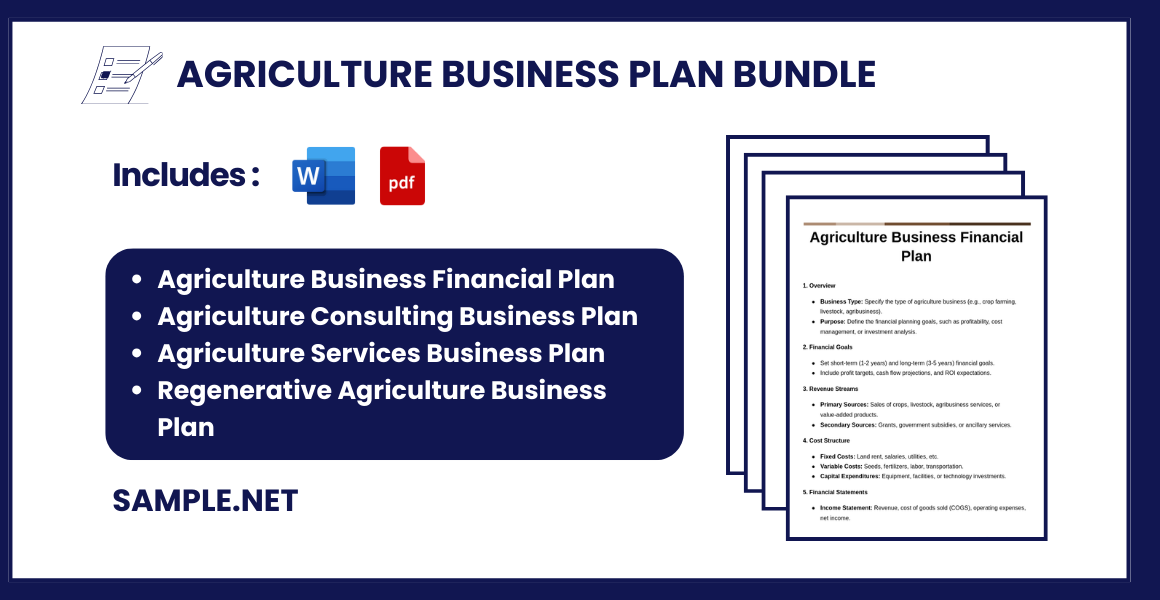
Download Agriculture Business Plan Bundle
Agriculture Business Plan Format
1. Executive Summary
- Introduction: Briefly introduce the business, mission, vision, and goals.
- Business Idea: Highlight the specific agricultural products or services offered.
- Target Market: Summarize the market analysis and the intended customer base.
- Financial Overview: Present an outline of projected income, expenses, and profitability.
2. Company Overview
- Business Name and Structure: Mention the name and legal structure (e.g., sole proprietorship, partnership).
- Location: Provide details of the business location (e.g., farm, office, etc.).
- Business History: If applicable, include background information about the farm or company.
- Mission Statement: State the mission that guides the business.
- Vision Statement: Define the long-term vision for the agriculture business.
3. Industry and Market Analysis
- Agricultural Trends: Analyze current trends in the agriculture sector.
- Target Market: Describe the demographics and needs of the target customers.
- Market Size and Growth: Provide an estimate of the market size and potential for growth.
- Competitor Analysis: List key competitors, their strengths and weaknesses, and your competitive advantage.
- Regulatory Considerations: Note any agriculture-specific regulations or requirements.
4. Products and Services
- Product Line: Describe the agricultural products or services offered (e.g., crops, livestock, organic produce).
- Production Process: Explain how products will be grown, harvested, or produced.
- Unique Selling Proposition (USP): Highlight what makes your products/services different (e.g., organic farming, eco-friendly methods).
5. Marketing and Sales Strategy
- Marketing Plan: Detail strategies for promoting products (e.g., digital marketing, farmer’s markets, partnerships).
- Pricing Strategy: Define how products will be priced (e.g., cost-based, value-based pricing).
- Distribution Channels: Outline the channels used to reach customers (e.g., wholesalers, direct-to-consumer).
- Sales Plan: Include projected sales volumes and strategies for reaching sales goals.
6. Operations Plan
- Production Plan: Detail how crops or livestock will be cultivated, cared for, and harvested.
- Suppliers and Inputs: List suppliers of seeds, fertilizers, equipment, etc.
- Equipment and Machinery: Describe the equipment and machinery needed for operations.
- Facilities: Explain the physical setup of the farm, processing units, or other facilities.
- Staffing Plan: Outline the roles, responsibilities, and number of employees required.
7. Management and Organization
- Management Team: Provide bios and roles of key management personnel.
- Organizational Structure: Display the organizational hierarchy of the business.
- Advisory Board (if any): Mention any advisors or experts consulted for business guidance.
8. Financial Plan
- Startup Costs: List all costs for starting the business (e.g., land, equipment, seeds).
- Projected Income Statement: Present revenue, expenses, and profits for the first 3-5 years.
- Cash Flow Projection: Include cash flow forecasts for 3-5 years.
- Balance Sheet: Offer a projected balance sheet for 3-5 years.
- Break-Even Analysis: Calculate when the business is expected to break even.
- Funding Requirements: State the amount of funding required and its intended use.
9. Risk Analysis
- SWOT Analysis: Detail the business’s strengths, weaknesses, opportunities, and threats.
- Risk Management Plan: Describe measures to mitigate potential risks (e.g., crop failure, market fluctuations).
10. Appendix
- Supporting Documents: Include any supporting documents, like market research data, licenses, contracts, etc.
- Visuals: Add diagrams of farm layout, production plans, or organizational charts if necessary.
What Is an Agriculture Business Plan?
An Agriculture Business Plan is a formal document that outlines the objectives, strategies, resources, and financial projections of an agricultural enterprise. It details various aspects such as crop selection, livestock management, resource allocation, marketing strategies, and financial forecasts. It serves as a guide for agricultural entrepreneurs to develop, manage, and scale their businesses while addressing potential risks and market opportunities. You can also see more on Farming Proposal.
Benefits of Agriculture Business Plan

In all agriculture business examples, a business plan is a must. Businessmen work with it because they can get a lot of benefits from it. They can be sure that they can make their business flourish through a business plan. It has a lot of advantages that can surely make your business advanced from other businesses. Read and consider the following benefits of an agriculture business plan:
Tips on Agriculture Business Plan
As mentioned earlier, running a farm is no easy task. With a lot of factors to consider in your business plan, you’ll probably need tips on how to get started with your document.You can also see more on Marketing Business Plan.If so, then below are the following tips we provide you to ease your concerns. Have the following tips:
How to Write an Agriculture Business Plan
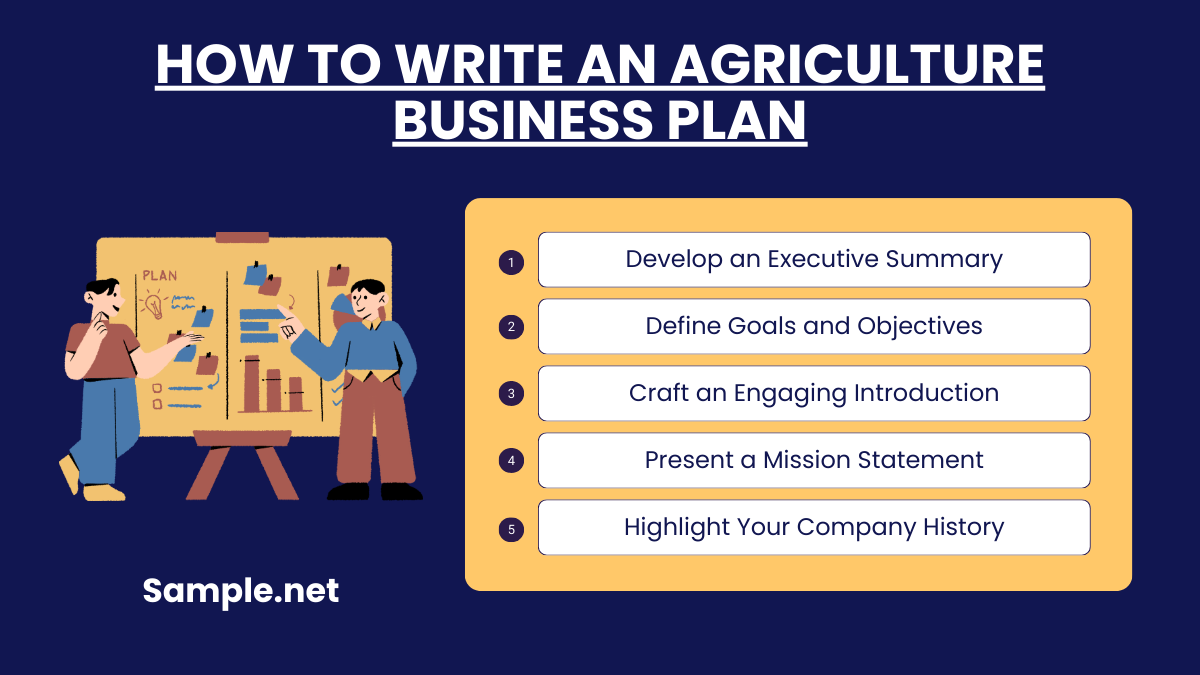
Creating a robust Agriculture Business Plan involves a systematic approach that aligns your vision, goals, and strategies. The following steps outline the key components required for developing a comprehensive plan. You can also see more on Annual Business Plans. Additionally, if you need a free agriculture business plan template for guidance, we have included one in this post.
Step 1: Develop an Executive Summary
The Executive Summary is the initial section of your business plan, offering an overview of the entire document. It should outline the core aspects of your agricultural business, including its goals, operational focus, and target market. It’s crucial to make this summary engaging, as it’s the first section investors and stakeholders read. Your business profile, along with a brief introduction to your plan’s purpose, should be clearly presented to capture attention and establish credibility.
Step 2: Define Goals and Objectives
Following the Executive Summary, outline the goals and objectives of your agricultural venture. This section should emphasize the business’s mission and purpose, demonstrating your commitment to achieving specific milestones. Well-defined objectives not only inspire confidence in your audience but also provide clear direction for operational and strategic efforts. Be precise and realistic, ensuring your goals align with the broader vision of the business.
Step 3: Craft an Engaging Introduction
Begin the body of your business plan with an introduction that provides insights into the founders and key members of your team. Highlight their backgrounds, expertise, and roles in establishing the business. This personal touch not only adds credibility but also allows stakeholders to understand the motivations and experiences behind your venture. It sets the stage for the subsequent sections of the business plan.
Step 4: Present a Mission Statement
A well-crafted Mission Statement showcases your company’s core values, ethics, and long-term aspirations. It should reflect the principles that guide your business beyond profit-making. This statement helps to establish a connection with your audience, showing that your venture is driven by a strong sense of purpose, such as sustainable agriculture, community development, or innovation in farming practices.
Step 5: Highlight Your Company History
Use this section to share the story behind your company’s founding, development, and achievements. A concise history that includes significant milestones, growth phases, and challenges overcome can enhance your plan’s authenticity. It should also cover your business’s evolution, key achievements, and the principles that have shaped its journey. This background not only adds credibility but also builds a positive image of the company for readers.
An Agriculture Business Plan is essential for guiding agricultural ventures toward profitability and sustainability. It serves as a tool for planning, managing, and growing agribusinesses. By clearly defining goals, strategies, and financial projections, this plan helps entrepreneurs adapt to changing market trends and manage risks effectively. A well-developed plan can attract investors, align operations, and promote long-term growth. You can also see more on Retail Business Plan.
FAQs
What is the use of an agriculture business plan?
An agriculture business plan can guide you on everything that you can do to make your business successful. It is used to get investors that can support your business. It is shown to clients who can patronize your products. You can also see more on Product Business Plan.
Is there a great income in an agriculture business?
The income may vary with the type of business. But sometimes the income is not high. It depends on the value of the property.
How often should an Agriculture Business Plan be updated?
It should be reviewed annually or whenever there are significant changes in market conditions, production strategies, or financial goals.
How does market research impact an Agriculture Business Plan?
Market research helps identify consumer preferences, pricing strategies, and competitors. It guides production decisions, marketing strategies, and resource allocation, making the business more competitive and aligned with market demands. You can also see more on College Business Plan.
How can technology enhance an Agriculture Business Plan?
Integrating technology, such as automated irrigation, precision farming, and data analytics, improves production efficiency, reduces costs, and enhances decision-making. This modernization aligns the business with future trends, increasing profitability and scalability.
What makes an Executive Summary effective in a business plan?
An effective Executive Summary is concise, compelling, and gives a clear overview of the business plan. It should include key business goals, an outline of the market, financial projections, and the company’s vision, making it appealing to investors. You can also see more on Market Research Business Plan.
Is a mission statement necessary for an Agriculture Business Plan?
Yes, a mission statement outlines the core values and purpose of the business. It helps align operations with long-term goals and resonates with investors, partners, and customers, reflecting the company’s commitment to ethical and sustainable practices.
Why is sustainability important in an Agriculture Business Plan?
Sustainability promotes long-term viability by implementing eco-friendly practices, conserving resources, and reducing waste. It attracts environmentally conscious consumers and partners, complies with regulations, and can improve market positioning, ensuring the business’s relevance and growth. You can also see more on Competition Business Plan.
